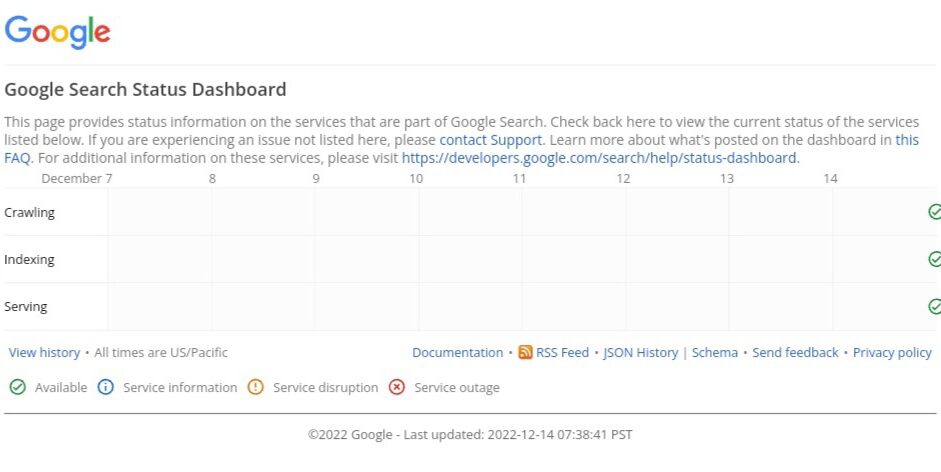There’s now an official page to answer the question: “Is Google down right now?”
Google is rolling out a search status dashboard that will inform you, in real-time, whether there’s an issue with crawling, indexing, or serving search results.
Previously, Google’s Site Reliability Engineers (SRE) informed searchers about outages via the Google Search Central Twitter account.
Now, Google will use the Search Status Dashboard to communicate the status of its search engine.
Is Google Down Right Now?
At the time of this writing, Google is up and running.
I know that because I’m looking at Google’s Search Status dashboard, which displays green checkmarks to communicate all three services (crawling, indexing, and serving) are available.

Google’s Search Status Dashboard reports widespread issues occurring within the past seven days, along with details about the status of the problem.
Google claims widespread issues and disruptions are “rare,” but that doesn’t mean they never happen.
A widespread issue is defined as:
“A widespread issue means there’s a systemic problem with a Search system affecting a large number of sites or Search users. Typically these kinds of issues are very visible externally, and internally the SREs’ monitoring and alerting mechanisms are working behind the scenes to flag the issues.”
Google Search experienced a rare, widespread outage in August 2022, and the whole ordeal could have been handled better if a Search Status Dashboard had existed at the time.
Instead of everyone flooding Twitter with tweets asking, “Is Google down right now,” they could have checked the dashboard to get an answer.
Unfortunately, Google outages aren’t preventable. The best Google can do is keep the public informed when issues are detected and provide status updates when available.
Google Search Status Dashboard – How It Works
Google will post an update to the Search Status Dashboard within an hour of confirming an ongoing, widespread outage.
The start time of the outage, as noted in the dashboard, refers to the time when Google discovered the problem, not when the outage began.
Google promises to provide consecutive outage updates within 12 hours of the first update.
Additionally, Google may provide information that can assist with solving the problem:
“Outside of the traditional status update you might see, we will also try to provide more information that might resolve the solution. For example, in the hypothetical scenario that the nameserver handling domain name resolution for millions of sites refuses Googlebot’s connection requests, we may post an update saying that changing nameservers may mitigate the issue sites are experiencing.”
Google will mark an issue resolved when its SREs confirm they’ve applied the proper fix. However, Google says effects may linger after the problem is fixed, depending on the type of issue.
Source: Google
Featured Image: Andrew Krasovitckii/Shutterstock
window.addEventListener( ‘load’, function() {
setTimeout(function(){ striggerEvent( ‘load2’ ); }, 2000);
});
window.addEventListener( ‘load2’, function() {
if( sopp != ‘yes’ && addtl_consent != ‘1~’ && !ss_u ){
!function(f,b,e,v,n,t,s)
{if(f.fbq)return;n=f.fbq=function(){n.callMethod?
n.callMethod.apply(n,arguments):n.queue.push(arguments)};
if(!f._fbq)f._fbq=n;n.push=n;n.loaded=!0;n.version=’2.0′;
n.queue=[];t=b.createElement(e);t.async=!0;
t.src=v;s=b.getElementsByTagName(e)[0];
s.parentNode.insertBefore(t,s)}(window,document,’script’,
‘https://connect.facebook.net/en_US/fbevents.js’);
if( typeof sopp !== “undefined” && sopp === ‘yes’ ){
fbq(‘dataProcessingOptions’, [‘LDU’], 1, 1000);
}else{
fbq(‘dataProcessingOptions’, []);
}
fbq(‘init’, ‘1321385257908563’);
fbq(‘track’, ‘PageView’);
fbq(‘trackSingle’, ‘1321385257908563’, ‘ViewContent’, {
content_name: ‘is-google-down-right-now’,
content_category: ‘news seo’
});
}
});
Source
[sibwp_form id=1]


